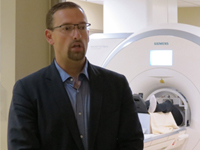
Up close and personal with Dr. Tom Schweizer
I interact with a lot of patients at St. Michael’s Hospital’s memory clinic and at the stroke and brain tumour clinics. Often, the first words out of people’s mouths isn’t about their condition, but about their driver’s license. They want to know when they are going to get it back.
At first, it was mind-boggling for me that they wouldn’t begin with questions about the possibility of their tumour coming back, or the results of their memory tests. Obviously their inability to drive is such a source of anxiety that it often overrides their immediate medical condition.
But it’s understandable if you think about it. If you take someone’s license away, it has serious consequences. They will feel isolated. They will feel like they are a burden on family members who have to drive them everywhere.
When I understood just how devastating it was for them to lose their autonomy, I decided to research driving impairments among those with neurological diseases such as Alzheimer’s.
Every doctor wants to make good clinical decisions. Some people with mild cognitive impairment and early stage Alzheimer’s disease can still drive safely. The first step is to understand the basic science of what is going on in the brain when people with neurological conditions drive.
It really is exciting work to uncover these mysteries in the brain. It’s like being a detective, and having patients and their families on board makes it all the more satisfying.
Learn more about how the Alzheimer Society supports research or if you would like to donate to bio-medical researchers like Tom.
 Dr. Tom Schweizer, St. Michael’s Hospital
Dr. Tom Schweizer, St. Michael’s Hospital
Funded by the Alzheimer Society Research Program